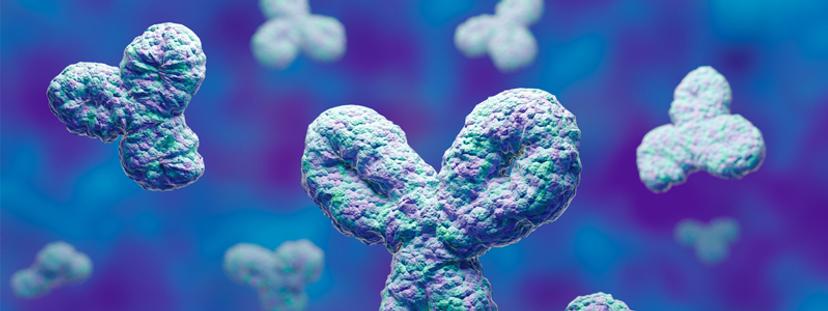Antibody drug development: Key resources for scientists
Improve antibody characterization and analysis workflows for monoclonal antibodies with these free resources
12 Oct 2022

Antibody drug development is a growing field, with antibody-based drugs accounting for many new approvals. The use of monoclonal antibodies in immunotherapy has enabled the development of targeted treatments for diseases such as cancer, auto-immune disease, and viral infection that are effective while minimizing off-target effects that occur with other treatment methods, such as chemotherapy.
To ensure the safety and efficacy of antibody therapeutics, it is important their properties as well as their impact on immune response is well characterized during antibody drug development. Here, we collate some of the latest methods and technologies that are helping to advance antibody drug development.
Developing a highly robust, efficient, and cost-effective monoclonal antibody workflow
In this application note from Eppendorf, discover top tips for increasing the reproducibility and productivity of your mAb research and antibody drug development process. Explore how you can optimize process development, scale up, and manage devices to maximize yields and prevent instrument downtime using instruments including the Eppendorf BioFlo® 320 benchtop bioprocess system.
SEC-MALS analysis of antibody therapeutics: A robust method for in-depth sample characterization
Characterization of antibody aggregation and fragmentation is a key step in antibody drug development. In this application note, Tosoh Bioscience demonstrates the benefits of the LenS3 Multi-Angle Light Scattering Detector combined with the TSKgel® UP-SW3000-LS SEC column for analysis of monoclonal antibodies. The method can determine the molecular weights of sample components and is sensitive down to less than 50 ng of dimerized antibody.
In-solution measurement of antibody affinities and binding stoichiometries
Elucidating mechanism of action is an important step in antibody drug development. In this application note by Fluidic Analytics, learn how Microfluidic Diffusional Sizing (MDS) technology of the Fluidity One-M can be used to quantify and characterize a monoclonal antibody that binds to α -synuclein monomers, oligomers, and fibrils. The assay takes only 2–3 hours, is immobilization-free, provides universally comparable KD values to assess specificity, and determines stoichiometry, required to investigate the mechanism of action.
Tools to monitor immunogenic responses in antibody drug development
In this white paper from RayBiotech Inc., learn how the monitoring of efficacy and immunogenic responses to an antibody therapeutic can be aided by immunoassays tailored to the drug of interest, its target, and even its downstream effects. Here, discover fit-for-purpose assay formats corresponding to each R&D goal in the antibody drug development process.
Validating quality and specificity of antibody libraries using cell sorting
In this video, Dr. Frédéric Leduc, Immune Biosciences, discusses his work engineering next-generation immunotherapies with applications in infectious disease and oncology. Leduc explains how the Sony SH800 Cell Sorter provides a simplified cell sorting solution for all stages of the antibody drug development process from target validation to biomanufacturing.
Engineering recombinant immune checkpoint proteins for antibody drug development
Antibody drugs that target immune checkpoints are a key focus in the development of therapies for cancer and other diseases. In this scientific poster, ACROBiosystems presents a series of examples of recombinant protein engineering for antibody drug development guided by their structural, biological, and biochemical properties.
The SelectScience biopharmaceutical community offers a wealth of downloadable resources, interviews, online events, and news to help you optimize antibody drug development. Register for free to receive your free SelectScience biopharmaceutical newswire (see our October edition) to keep up to date.
